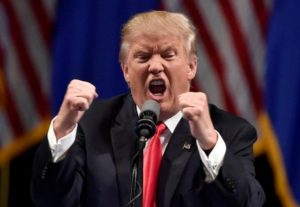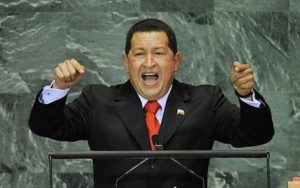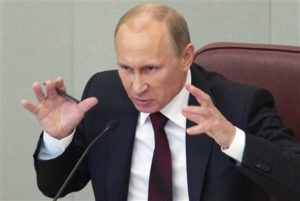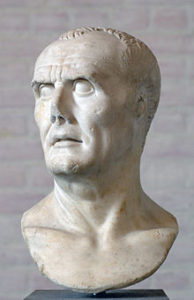 This is part 2 of probably 6 posts on Trump, of which the first one is here. These are not predictions of the future per se, but just a recording of what I worry might happen, and why I can’t sleep at night.
This is part 2 of probably 6 posts on Trump, of which the first one is here. These are not predictions of the future per se, but just a recording of what I worry might happen, and why I can’t sleep at night.
A slow unfolding
It takes a long time, sometimes years, for the authoritarian to tip the system in his favor, to undermine enough counterbalancing institutions that he can no longer be opposed.
A leader willing to do whatever it takes to keep and increase power can – over time – chip away at resistance. After a few years, there might be very little left standing in his way.
Chavez
I remember well the day after the election of Chavez in Venezuela in 1998, as I worked on Goldman’s Latin American bond desk. We hardly knew Chavez’ name and background, but our economist who covered the Andean countries warned us that this would certainly be a catastrophic regime for Venezuela. He was right, although it took some time to play out that way.
 First Chavez had to replace governors and mayors with loyalists. He needed to delegitimize the opposition parties and the opposition newspapers. He needed to overturn the system.
First Chavez had to replace governors and mayors with loyalists. He needed to delegitimize the opposition parties and the opposition newspapers. He needed to overturn the system.
Like many authoritarians, Chavez initially sought the legitimacy of constitutionality. He called a constitutional convention in 1999, and had it 95 percent packed with Chevez loyalists. These conventioneers in turn set about abolishing the existing legislature and courts.
A new single house of Congress replaced the old Congress, and handed legislative authority over to Chavez. The Presidential terms was extended to six years, with the chance for reelection, which of course Chavez got.
The Supreme Tribunal of Justice – established at the constitutional convention of 1999 – has recently been rated the most corrupt court in the world by Transparency International.
As fragile as Venezuela’s political system had been at the time of Chavez’ election, it started with important political checks in the form of two parties that had alternated power for decades, a free press, and strong banks. Dismantling them took time, consistent pressure, and some populist violence. Fomenting a constant state of semi-war against Colombia, plus the perceived threat of the United States, helped consolidate Chavez’ power.
Putin
Putin’s rise from semi-obscure Yeltsin-appointee to seeming lifetime Tsar of Russia was not pre-ordained. Many steps along the way helped him eliminate rivals and seize complete power over the Russian state.
 Putin has only slowly dismantled an independent domestic press through intimidation, “tax investigations,” violence, and the murder of journalists. He coopted business oligarchs with whom he could do a deal, and jailed or exiled those who would not cooperate. Regional Governors are hand-picked by the President in Russia.
Putin has only slowly dismantled an independent domestic press through intimidation, “tax investigations,” violence, and the murder of journalists. He coopted business oligarchs with whom he could do a deal, and jailed or exiled those who would not cooperate. Regional Governors are hand-picked by the President in Russia.
All along, Putin has been careful to cloak his actions in constitutional forms. The legislative Duma is dominated by Putin’s party – along with some acquiescent minority parties like Communists – with the veneer of regular elections to signal legitimacy.
Putin rise is a sort of blended electoral victory and seizure of power in the face of corruption and chaos. He became acting president following the resignation of the ailing Boris Yeltsin, and then won election in 2000 by a 53% to 30% margin. Putin, like Chavez before him, has insisted on holding regular elections and even respecting the letter of the law regarding Presidential term limits, even while few believe he ever took his hands off the levers of power during Dmitri Medvedev’s Presidential inter-regnum, 2008 to 2012.
Putin’s accession and consolidation of power was greatly aided in September 1999, however, by a series of apartment building bombs blamed on Chechen rebels but believed by many to be the result of a ‘false flag’ operation by Russian security forces, known as the FSB.
Putin’s rise may be the most relevant example to watch with Trump. Dangerous authoritarians may arrive via the ballot and constitutional legitimacy, only to set to work to undermine that same constitutional structure. I think that’s what I’m most worried about with Trump.
The first few months

History does not afford us counterfactuals with which to test the following claim, but it seems the first few months and the first two years in particular are when brave patriots have to stand up and take risks in the face of encroaching authoritarianism.
If the authoritarian finds little resistance to eroding institutional checks on his power, the regime can move much more quickly. I am worried about where the checks and balances on Trump’s power will come from in his first few months in office.
 I’m desperately reading Plutarch’s Fall of The Roman Republic right now, looking for signs of the end of our republic. Plutarch describes Senators bowing before the Roman strongman Gaius Marius[1], who demanded a humiliating oath. One of Marius earliest mentors Metallus remains an honorable Senator to the end, saying:
I’m desperately reading Plutarch’s Fall of The Roman Republic right now, looking for signs of the end of our republic. Plutarch describes Senators bowing before the Roman strongman Gaius Marius[1], who demanded a humiliating oath. One of Marius earliest mentors Metallus remains an honorable Senator to the end, saying:
“It is certainly sordid to do the wrong thing, and anyone can do the right thing when there is no danger attached; what distinguishes the good man from others is that when danger is involved he still does right.”
Where is the principled institutional opposition to Trump? Are there enough good men and women?
I assume the Democratic opposition – such as it is in 2016 and 2017 – will try its best. I expect newspapers and legitimate news organizations will continue to claim that the rise of Trump is “Not Normal” in terms of the threat to constitutional government in the United States.

What will the courts do? Will a Republican Congress stand up to him? How will governors and mayors respond? Will good people in the FBI, the military, the police, and the NSA do what’s right, rather than what he may ask them to do? All of these people and institutions will be tested.
Please see related posts on Trump:
Trump Part III – The Uses of A Security Crisis
Trump Part IV – The Uses of an Economic Crisis
Trump Part V – The Constitutional Crisis
Trump VI – Principled Republican Leadership
Also, previously:
Trump as Candidate – Sovereign Debt Genius
Clinton and Trump as Candidates – Economic Policies Compared
[1] Marius was born 57 years before Caesar and ruled Rome approximately 50 years before him. His authoritarian descent into murderous rule – followed by similar strongmen like Sulla – is one of the precipitating events leading to the fall of the Roman Republic and the conversion of the Republic to an Empire under the Caesars.
Post read (397) times.





2 Replies to “Trump Part II – Rise of Authoritarians”
“It takes a long time, sometimes years, for the authoritarian to tip the system in his favor, to undermine enough counterbalancing institutions that he can longer be opposed.”
A great, recent, and more relevant example of this can be found in Clinton’s close dealings with those in the DOJ:
http://www.politico.com/story/2016/11/wikileaks-clinton-justice-department-heads-up-investigation-230643
Obviously, there are plenty of Republican examples throughout recent history, but to ignore the more recent and egregious only shows your blind loyalties.
It’s incredibly convenient when a politician so well connected politically that not only has top-level government access, but also a massive slush fund you can use to bribe and finance their way in and out of virtually anything.
http://nypost.com/2016/10/03/book-details-how-team-obama-schemed-to-let-hillary-skate/
Only a banker can love a career politician whose 30 years of public service transformed them a billionaire.
“Putin has only slowly dismantled an independent domestic press through intimidation, “tax investigations,” violence, and the murder of journalists.”
In America, we simply buy them. See Bezos’ purchase of WaPo, Carlos Slim’s ownership of the NYTimes, among other. I don’t see any journalists murdered (except figuratively on Twitter where they tend to become thoroughly discredited) but there is quite the trail of dead people coming out of DNC headquarters – and, for that matter, the banking sector. Care to dispel your great wisdom on that?
“Where is the principled institutional opposition to Trump? Are there enough good men and women?”
For many reasons (one being the example I gave above), we sorely lack in principled institutions these days. One of the single biggest takeaways from this election year is the exposure of the media to be completely untrustworthy and utterly biased. The fact that mainstream media is roughly at par with the approval levels of Congress is a significant tell that we are all in a dangerous place right now. And while the Democrats laughed and joked about how the Republican party is dead, the Democrat party itself has taken a turn that most still can’t even see. Maybe because it’s because they’re too busy reading Fall fo the Roman Republic.
This election was transformational, in many significant ways. Many truths about the pay-to-play business in our top offices exposed to the public, as was the completely and utterly discredited media coverage. You lament that America is sliding towards authoritarianism, but you blithely refuse to acknowledge the high crimes and misdemeanors that are currently in office.
So stick to banking topics. And reconsider your politics – not only are your ideas played out, but they lost, bigly.
As my colleague Mr. McPoop has ably demonstrated, another characteristic of an aspiring dictator (or aspiring dictator fans) is to claim that the opposition has already done every horrible thing you could ever desire to do in the darkest corners of your dictatorial heart.
This beautifully accomplishes two goals:
First, it desensitizes the public to such claims – if we casually and repeatedly mention “high crimes and misdemeanors” about something as pedestrian as email discovery, it becomes so meaningless that we can finally stop worrying about that pesky Article II Section 4 when we cross the Rubicon.
Second, this distracts from any discussion of what the aspiring dictator has done and intends to do – just change the subject. Don’t try to argue that you don’t have authoritarian impulses. (Too hard! And why would we want to argue against Putin’s authoritarianism when there’s so much to admire there?) Just change the discussion to be about the opposition, or, even better, the author of the offending piece!